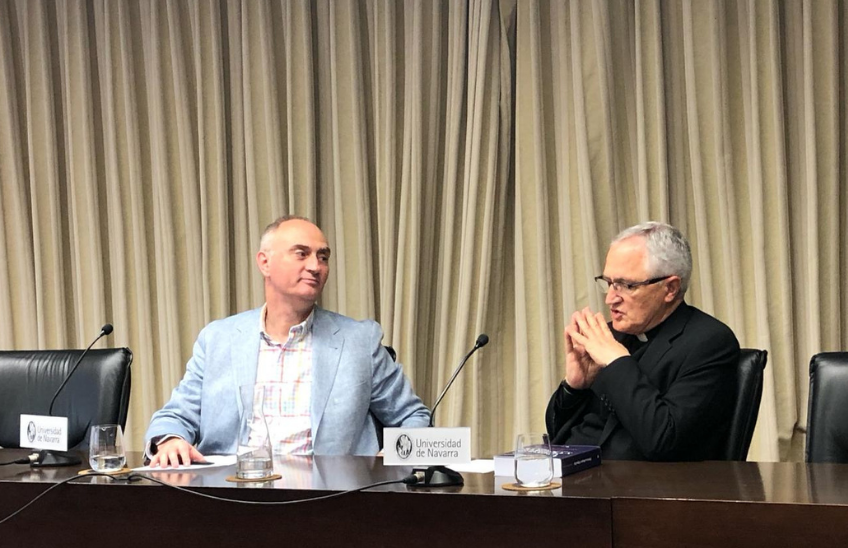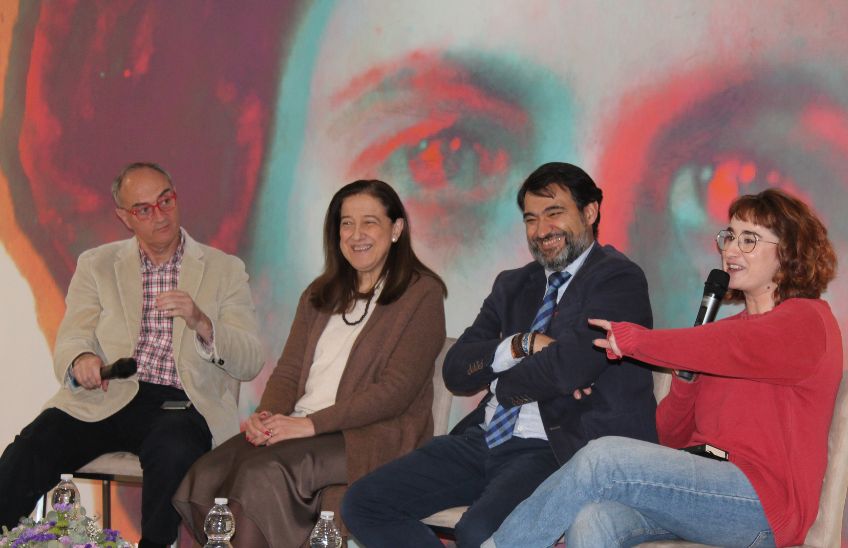In memoriam: José Luis Illanes (1933-2025)
José Luis Illanes, priest, theologian and Professor Emeritus of the University of Navarra, died in Pamplona at the age of 91. Illanes was a core topic figure in the School of Theology, he dedicated his life to the study of contemporary Christian thought and to the promotion of research on Opus Dei and its founder.

25 | 04 | 2025
José Luis Illanes Maestre was born in Seville on December 26, 1933, into a Christian family. He began his programs of study in Law at the University of Seville, influenced by the profession of his father, a lawyer and politician. In 1955, at the age of 22, he asked for admission to Opus Dei, a fact that marked a decisive turning point in his life. As he himself expressed, he found in the spirit of Opus Dei a profound synthesis between the human and the Christian, which gave a new meaning to his faith and his professional vocation.
In 1956 he moved to Rome, a city with which he maintained a lifelong bond. There he obtained the licentiate degree and the doctorate in Theology at the Pontifical Lateran University, where he had as professors outstanding theologians of the time. His doctoral thesis , centered on Jacques Maritain, dealt with Christian humanism, a theme that would run through his entire intellectual trajectory. He was ordained priest in 1960 and began his teaching at the Roman high school of the Holy Cross, specializing in Fundamental and Dogmatic Theology.
César Izquierdo, Professor Emeritus of the School of Theology at the University of Navarra, points out that during the years of the Second Vatican Council, which Illanes followed closely, "he appreciated that the Council had come to consolidate a way of doing theology in close connection with the life of the Church. In coherence with this vision, his first publications focused on themes such as the theology of work and sanctification in the midst of the world, which would become fundamental axes of his thought. In 1966, he participated in the Vatican II Theology congress , sharing a table with some of the most relevant figures of contemporary theology.
A mind that embraces the infinite, a heart that embraces the everyday.
After his years in Rome, José Luis Illanes joined the School of Theology of the University of Navarra in 1970. For more than three decades he developed an intense professor work in the areas of Dogmatic Theology, Fundamental Theology and Spiritual Theology. In addition, he was Dean of the School between 1980 and 1992, a period in which he consolidated his profile as a rigorous thinker and academic guide .
His dedication to study was reflected in his ability to address the great philosophical-theological problems of our time, always with a deep ecclesial sense and a constant concern for Christian life in its various dimensions. Through his almost 400 academic publications, Illanes sought to integrate faith and reason, theory and daily life, creating a bridge between theological thought and human experience.
César Izquierdo has underlined how in his texts "one discovers a great closeness to the European theology of the 20th century and a very special concern for everything that has to do with the Christian condition in its various aspects. All this penetrated by a deep ecclesial sense, whose ultimate meaning has undoubtedly been nurtured by his pastoral occupations, his priestly condition, his professor work and his managerial responsibilities in the School of Theology of the University of Navarra".
Among his most important works are The Sanctification of work and Christ, Hope of the World, as well as numerous specialized articles on spiritual theology, secularism and Christian mission statement
As several of his students recall, his work was not limited to the academic field. He always showed a genuine interest in training the new generations, accompanying them closely, guiding them in their programs of study and encouraging them to broaden their horizons through training stays abroad.
His work in the Church
The theological activity of José Luis Illanes transcended the limits of the classroom. He participated as a member of the Presbyteral committee of the Archdiocese of Pamplona for several years. In addition, from 1987 to 1990, he was a member of the Organizing Commission of the Pastoral Synod of the Church in Navarra and collaborated with various commissions of the Spanish Episcopal lecture and the Vatican.
In addition, he gave courses and conferences in many countries of Europe and Latin America, especially in seminaries and priestly training centers. Throughout his life, he was an active member of several international theological associations, where he contributed with clarity and depth his vision of Christian vocation and holiness in ordinary life.
Creating spaces to think together
Another of the fundamental axes of José Luis Illanes' intellectual activity was the study of the foundational charism of Opus Dei and its place in the life of the Church. In the 1990s he promoted the creation of the Centro de programs of study Josemaría Escrivá (CEJE), with the goal of promote scientific research on Opus Dei, its founder and its members.
Federico Requena, one of the first to join the team, recalls that "CEJE had started small, but in Illanes' mind it was destined to grow". During his years at the head of the center, Illanes was able not only to assemble a solid team, but also to make it work effectively. Requena points out that "we were all able to appreciate his ability to listen, to bring out the most positive in everyone and to involve everyone with initiative. Equally evident were his speed, conciseness and order in the way he approached the work and, at the same time, his ability to create a relaxed and trusting atmosphere.
He also highlights his attitude in the face of difficulties: "His permanent good humor and his ability to take the drama out of the problems and difficulties that arose contributed significantly to this. At the same time, I must admit that, on some occasions, I found this positive outlook excessive and, more than once, the idea came to my mind that Mr. José Luis was a specialist in trying to square the circle".
Along the same lines, Requena points out the importance that Illanes gave to convivial moments, such as work lunches, which were common at CEJE: "Throughout these years there have been countless meetings of this subject, which were usually the basis for new projects and new contacts".
Santiago Martínez, who joined CEJE in 2008, also recalls José Luis' empathy, his welcoming disposition, his open-mindedness and his great capacity to work, which he was able to maintain until almost the end of his life. "From the beginning of our attention , I appreciated his facility to speak (at full speed, of course), to transfer his ideas to paper (he was a prolific writer), his overwhelming sympathy, his conviction and firmness to argue and kindly refute the points of view of others and, especially, to find common elements that united in dialogue and action. A man with a powerful capacity for integration, which helped him to create teams and lines of work that are maintained after he handed over the baton to others".
The CEJE was joined in the late 1990s by a commission created to promote programs of study on St. Josemaría in preparation for the centenary of his birth in 2002. Based on his experience and the work in progress, José Luis Illanes proposed to the Prelate of the Work, Javier Echevarría, the creation of the St. Josemaría Historical Institute (ISJE), which he established on January 9, 2001. Since then, the CEJE has become a section of the ISJE.
José Luis Illanes himself commented in an interview that of the "multitude of ideas proposed, the clearest and most supported was to create a journal that would give body to the Institute, promote among the people of the Work an interest in historical research on Opus Dei and offer historians a clear point of reference letter for the knowledge the history of the Work. So it was that he began to work, together with a group of historians, on the preparation of Studia et Documenta, a journal that has become a space for the publication of programs of study on the history of Opus Dei, its founder, members and the ecclesial and cultural context.
Throughout his life, José Luis Illanes not only thought and wrote a lot about the Christian vocation: he also lived it with depth, discretion and constancy.
Beyond his numerous publications and projects, he knew how to weave community. With his approachable style and broad vision, he sowed concerns, accompanied research and created the conditions for others to think, write and dialogue on the great themes of Christian life. His life is a testimony of how a theological vocation can open roads, build bridges and generate spaces where faith, reason and life meet fruitfully.



